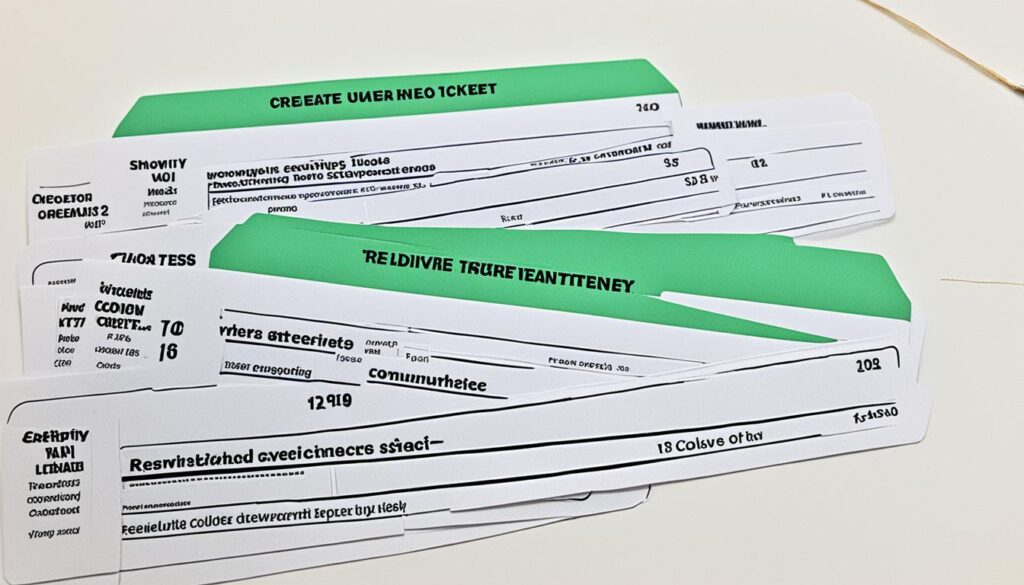Welcome to our article on the art ticket escalation process, where we’ll explore how to effectively resolve customer service issues in a timely manner. As an art business, providing exceptional support to your customers is crucial for maintaining their satisfaction and loyalty.
Art ticket support involves managing a large volume of inquiries, ranging from ticket creation and tracking to communication and resolution. However, not all issues can be resolved immediately by ground-level agents or support bots, leading to customer frustration. That’s where the art ticket escalation process comes into play.
The art ticket escalation process involves transferring a ticket to a higher-level support agent or manager who has the expertise and authority to resolve complex inquiries. This multi-tiered support system ensures that every issue is handled with the utmost care and attention it deserves.
By prioritizing and swiftly resolving escalated tickets, you can meet customer expectations and enhance their satisfaction. Time is of the essence, and resolving issues promptly demonstrates your commitment to providing exceptional art customer service.
In the following sections of this article, we will delve deeper into what ticket escalation is and how it works. We will also discuss why quick resolution of escalated tickets is important, when you should escalate a ticket, and provide tips for streamlining the art ticket escalation process. Let’s get started!
What is Ticket Escalation and How Does it Work?
Ticket escalation is a crucial aspect of effective customer service support. When a customer issue cannot be resolved by a support agent or through self-service options, it is escalated to a higher-level agent or manager. This allows for more expertise, resources, and authority to be brought in to resolve the issue quickly and efficiently.
The ticket escalation process works through a tiered support structure. It begins with self-service options where customers can find solutions to their problems independently. If the issue persists or requires more assistance, it is then escalated to a ground-level support agent. However, some issues may require even further expertise or authority, leading to the involvement of higher-level agents or managers.
Each tier of support within the escalation process has specific responsibilities and areas of expertise. Tickets progress through these tiers, ensuring that they are properly tagged and documented along the way. By adhering to standardized guidelines for troubleshooting and ticket tagging, clear communication is maintained throughout the process.
Service level agreements (SLAs) often dictate the timeline for communication with the customer during the escalation process. These agreements ensure that customers are informed about the progress of their ticket and when they can expect a resolution. Effective communication during ticket escalation helps to manage customer expectations and enhance overall satisfaction.
Key Components of Ticket Escalation:
- Tiered Support Structure
- Self-Service Options
- Ground-Level Support Agents
- Higher-Level Support Agents or Managers
- Standardized Guidelines
- Ticket Tagging and Documentation
- Service Level Agreements
- Communication with Customers
| Ticket Escalation Process | Benefits |
|---|---|
| 1. Customer issue is initially handled by self-service options. | – Quick resolution for simple inquiries – Empowers customers to find solutions independently |
| 2. If the issue persists, it is escalated to ground-level support agents. | – Access to agents with basic troubleshooting skills – Ability to handle common customer inquiries |
| 3. If further expertise or authority is needed, the ticket is escalated to higher-level support agents or managers. | – Specialized knowledge and skills to address complex issues – Authority to make decisions or provide solutions outside the scope of ground-level agents |
Through the ticket escalation process, customer issues receive the attention they require, ensuring that they are resolved efficiently. This structured approach helps to maintain a high level of customer satisfaction and contributes to a positive customer service experience.

Why is Quick Resolution of Escalated Tickets Important?
Quick resolution of escalated tickets is essential for meeting customer expectations and enhancing satisfaction. Customers expect fast and efficient resolutions when they reach out for support. Failing to meet these expectations can result in customer dissatisfaction and potentially lead them to switch to a competitor. According to the Zendesk Customer Experience Trends Report, about 50% of customers would switch to a competitor after just one bad experience with a company. This number rises to 80% after multiple bad experiences. Resolving issues quickly, even if the solution is not immediately available, demonstrates proactive customer service and helps maintain customer loyalty.
| Customer Expectations | Customer Satisfaction | Competitor Switching | Bad Experiences |
|---|---|---|---|
| Customers expect fast and efficient resolutions. | Meeting customer expectations enhances satisfaction. | About 50% of customers would switch to a competitor after just one bad experience. | This number rises to 80% after multiple bad experiences. |
Effective ticket escalation and resolution not only solve customer issues but also contribute to the overall success of a business. It is crucial for companies to prioritize quick resolution and provide exceptional customer support, as it directly impacts customer loyalty and brand reputation.

When Should You Escalate a Ticket?
In the ticket escalation process, it is important to know when to escalate a support ticket. Escalation should be considered when the issue cannot be resolved through self-service or by ground-level agents.
Expertise and authority play a crucial role in determining when to escalate a ticket. There are instances where additional expertise is required to address a specific issue. For example, technical issues may need assistance from developers who have in-depth knowledge and experience in resolving complex problems. Moreover, agents may not have the authority to provide certain solutions or authorize reimbursements, requiring the involvement of higher-level personnel.
Another factor to consider is the time to resolution. Tickets that cannot be resolved within the specified time frame outlined in service level agreements should be escalated. This ensures that customers receive timely responses and solutions to their issues, preventing dissatisfaction and potential customer churn.
Additionally, widespread problems or complex issues that impact a large number of customers should be escalated. By doing so, support teams can efficiently address the root cause and provide a resolution to all affected customers in a timely manner.
Knowing when to escalate a ticket is vital in delivering exceptional customer support and resolving issues effectively. The ticket escalation process ensures that support tickets are handled by the appropriate personnel with the necessary expertise, authority, and resources to achieve a successful resolution.
Situations that warrant ticket escalation
| Situation | Action |
|---|---|
| Issue cannot be resolved through self-service or by ground-level agents | Escalate the ticket to a higher-level support agent or manager |
| Additional expertise or authority is required | Escalate the ticket to a specialist or personnel with the necessary skills or authority |
| Ticket exceeds the specified time frame outlined in service level agreements | Escalate the ticket to ensure timely resolution |
| Severe or complex issues impacting a large number of customers | Escalate the ticket for efficient resolution and handling |
Tips for Streamlining the Ticket Escalation Process
To optimize your ticket escalation process and enhance customer support, it’s essential to leverage technology solutions. One such solution is a customer relationship management (CRM) system, which can simplify your customer support teams’ workflows and automate basic support tasks. With features like triggers, macros, and routing, you can ensure efficient ticket handling and resolution.
Triggers in your CRM system allow you to initiate specific actions within the workflow based on customer actions. For instance, you can automatically escalate a ticket if a customer submits a specific type of request or if the issue requires further expertise. Macros, on the other hand, can automate standardized responses, saving your agents valuable time and ensuring consistent communication with customers.
Additionally, routing functionality in your CRM can automatically direct tickets to the appropriate agent or department, ensuring they reach the right hands for quick resolution. This eliminates the need for manual ticket assignment, reducing errors and improving response times. Moreover, consider incorporating bots and messaging tools into your customer support strategy to provide self-service options, enabling customers to find resolutions on their own, and freeing up your support agents for more complex issues.
By leveraging technology and implementing these workflow improvement measures, you can optimize your ticket escalation process, enhance the efficiency and effectiveness of your customer support teams, and ultimately deliver a superior customer experience.
FAQ
What is the art ticket escalation process?
The art ticket escalation process is a method used to effectively resolve customer service issues in a timely manner. It involves moving a ticket to a higher-level support agent or manager for faster resolution.
How does the art ticket escalation process work?
The art ticket escalation process works through a tiered support structure, starting with self-service options and moving up to agents with more experience, expertise, and resources. Each tier of support has specific responsibilities, and tickets are tagged and documented as they progress through the escalation process.
Why is quick resolution of escalated tickets important?
Quick resolution of escalated tickets is essential for meeting customer expectations and enhancing satisfaction. Failing to resolve issues quickly can lead to customer dissatisfaction and potential loss of business.
When should you escalate a ticket?
You should escalate a ticket when it cannot be resolved through self-service or by ground-level agents, requires additional expertise or authority, cannot be resolved within the specified time frame, or is a severe or complex issue impacting a large number of customers.
What are some tips for streamlining the ticket escalation process?
To streamline the ticket escalation process, consider implementing technology solutions such as customer relationship management systems, triggers, macros, routing, bots, and messaging tools. These tools can automate tasks, optimize workflows, and provide efficient and effective support to customers.
